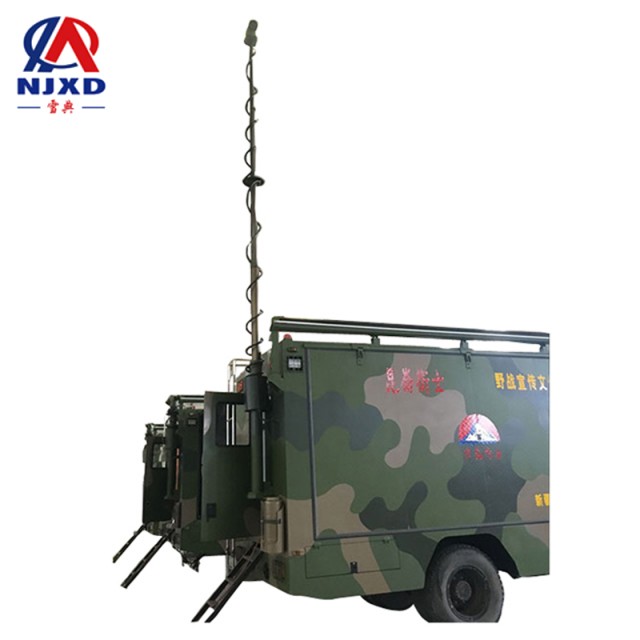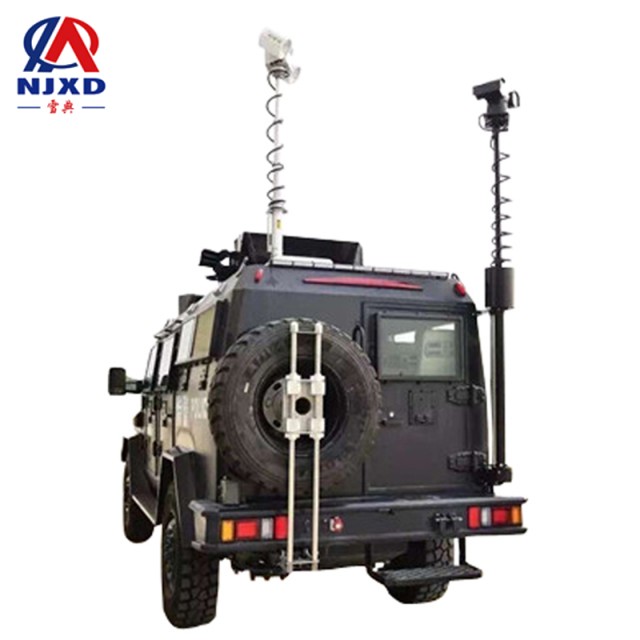NEWS
Safety measures for special vehicle vehicles special vehicle lifting bracket
Time:2021-06-02 View:

Special vehicles refer to vehicles that exceed the designed vehicle limits in terms of outline size, weight, etc. and for special purposes. They are specially made or specially modified and equipped with fixed devices and equipment, the main function is not a motor vehicle for manned or cargo transportation.
Special Vehicle generally has special marks or special vehicle types. Refers to the vehicles that are responsible for special service and hang special vehicle number plates, install and use alarms and sign lamps. Such as ambulance, fire truck, police car, breakdown lorry, military supervision car, etc.
Special Vehicle
Refers to all kinds of wheeled or crawler-type special vehicles used for traction, barrier removal, cleaning, lifting, loading and unloading, lifting, stirring, digging, pushing, road pressure, etc., or the car is equipped with fixed special instruments and equipment, vehicles engaged in professional work such as monitoring, fire fighting, cleaning, medical treatment, television broadcasting, radar, X-ray examination, etc.
For example, dump trucks, sweeper, cementing truck, fracturing truck, highway barrier-cleaning car, hydraulic aerial cage, concrete pump truck, snowploungh, etc. are widely used and have certain representative special vehicles.
Cause of oil leakage
In the use of vehicles, various special vehicle often have oil leakage faults. Oil leakage faults will directly affect the use and productivity of vehicles, resulting in waste of lubricating oil and fuel, consume the power and work efficiency of special vehicles.
Sanitation vehicles, engineering vehicles, van; Once oil leakage occurs, the internal lubricating oil of special vehicles decreases, resulting in poor lubrication of parts and poor cooling of parts, resulting in damage of parts and affecting the service life of vehicles, even leave hidden dangers of accidents.
I. Common causes of oil leakage of general vehicles are as follows:
1. Quality problems of accessories, raw materials or manufacturing processes of special vehicles;
2. Improper assembly speed, unclean matching surface, damaged gasket, displacement or failure to install according to the operation specification.
3. Uneven tightening force of fastening nut, slippery broken buckle or loose and falling off will cause work failure.
4. After long-term use, the sealing material is worn over the limit, aged, deteriorated and deformed.
5. Add too much lubricating oil, too high oil surface or add wrong oil.
6. Parts (side cover, thin-walled parts) joint surface deflection deformation, shell damage, make lubricating oil seepage.
7. After the vent plug and check valve are blocked, due to the pressure difference between inside and outside the box shell, oil leakage will often occur in the weak seal.

Preventive measures
1. Pay attention to the role of liner. The gasket between the components of the static parts of the automobile (such as each joint end face, each end cover, Shell, cover pad, flat enamel cover plate, etc.) plays a role of leak-proof sealing. If the materials, manufacturing quality and installation do not conform to the technical specifications, it will not be sealed and leak-proof, and even accidents will occur. Such as oil pan or valve cover, it is not easy to compact due to the large contact area, thus causing oil leakage.
2. All kinds of fastening nuts on the car should be tightened according to the specified torque. If it is too loose and not tight, the liner will leak; If it is too tight, the metal around the screw hole will be raised or the screw thread will slip, causing oil leakage. In addition, if the oil drain plug of the oil pan is not tightened or loose, it will easily cause oil loss, and then the machine loss accident of "burning tile holding shaft" will occur.
3. Replace the invalid oil seal in time. Many moving parts on the car (such as oil seal and O-ring) will be dumped due to improper installation, inconsistent Journal and oil seal cutting edge, and partial swing. Some oil seals will lose elasticity due to rubber aging after being used for too long. If oil leakage occurs in the rubber oil seal, it is mostly caused by its wear, aging or the groove of the rotating shaft journal that works with it.
4. Avoid blocking check valve and vent valve. As a result, the temperature inside the box shell increases, the oil and gas fills the whole space and cannot be discharged, which increases the consumption of lubricating oil and shortens the replacement period. After the engine ventilation system is blocked, the movement resistance of the piston is increased, which increases the fuel consumption. Due to the pressure difference between the inside and outside of the box shell, oil leakage will often occur in the weak seal. Therefore, regular inspection, dredging and cleaning of vehicles are required.
Vehicle safety
Special Vehicle reversing radar mainly considers two reasons:
1. The action distance needs to be farther and the scope needs to be wider;
2: Special vehicle the operating environment is complex and requires better environmental resistance, which is not affected by rain, fog, snow, etc.
Based on the above two points, generally, the more successful application cases abroad are realized by using millimeter wave based on FMCW principle. As the first millimeter wave reversing radar, Saiyu millimeter wave reversing radar has a working distance of up to 15 meters and a stable detection distance of less than 12 meters. The coverage range of a single radar probe is 80 °, which is not interfered by the external environment, comprehensive detection capability is much ahead of ultrasonic wave.

CATEGORY
NEWS
- Military vehicle classification military vehicle lift rod
- Safety measures for special vehicle vehicles special vehicle lifting bracket
- Differences of special vehicle vehicles special vehicle lifting mast
- Performance characteristics of mobile lifting lighting vehicle
- Technical parameters of mobile lifting lighting vehicle